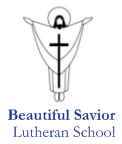O give thanks unto the Lord for He is good, His mercy endures forever (1 Chr 16:34). Beautiful Savior Lutheran Church - Winnipeg, MB
The Miracle of the Splitting Rocks
"The Miracle of the Splitting Rocks"
Mt. 27:51c
March 30, 2011
Click on the Play button
to listen to the Sermon.
Fellow baptized saints, it must have been more than deafening. Ears must have been ringing. Children must have been crying. Words cannot describe what took place on that first Good Friday at 3 o'clock in the afternoon. We hear in our text that "the rocks were split."
I don't know how the rocks were split. They were certainly not hit with anything like a hammer. There was no dynamite used. No machinery pounding away on them. The King James Version of the Bible uses the word rent. The word rent means to split or tear. The word might suggest that an inner stress caused the rocks to split. And there certainly was reason for stress on that dark day. Whatever way it happened, God did it.

Now the words "the rocks were split" have been seen by some as a fulfillment of what Jesus promised during His earthly ministry. In particular, the words He spoke during His triumphal entry into Jerusalem on that first Palm Sunday. Jesus was being praised, as we well know. People were waving palm branches and shouting Hosanna, that is save us. However, the Pharisees were doing anything but. One thing they were doing was planning His death. We read:
"Some of the Pharisees in the crowd said to Him, 'Teacher, rebuke your disciples.' He answered, 'I tell you, if these were silent, the very stones would cry out.' "
I can't imagine how this must have sounded. Think of it—rocks splitting apart, perhaps from inner stress, one after the other, some at the same time. Would it sound like popping, or thunder? Like fireworks or an avalanche?
Some Bible commentators believe that Jesus' crucifixion was so terrible, so unjust, so demeaning, so disgraceful, so wrong, and that the proper praise of what Christ was doing to save the world was so lacking, that to compensate the rocks cried out. His own creation, even the things without the breath of life, were crying out to Him, bearing witness to what He was doing.
Now we might be inclined to point the finger at the disciples, who deserted Jesus at His arrest. They should have been the ones crying out, yet they were not. Peter followed Him to the trial, but when a servant girl called Peter a disciple, he denied it. John and Mary were at the crucifixion, but we don't know where the others were, and none of them seemed to be praising Christ or testifying to the truth.
Of course, we might be inclinded to point the finger at the Pharisees, who planned Jesus' death; for the mock trial; for the nasty things they did; for inciting the crowd to cry out, "Crucify Him," and for all of the other things we heard in our reading. Hardly praise or recognition of the salvation Christ was accomplishing.
Or we might point the finger at the Romans. For after Pilate had washed his hands of the whole affair, we hear:
"The soldiers of the governor took Jesus into the governor's headquarters, and they gathered the whole battalion before Him. And they stripped Him and put a scarlet robe on Him, and twisted a crown of thorns, they put it on His head and put a reed in His hand, and kneeling before Him, they mocked Him saying, "Hail, King of the Jews!" And they spit on Him and took the reed and struck Him on the head. And when they had mocked Him, they stripped Him of the robe and put His own clothes on Him and led Him away to crucify Him." Not exactly the praise of splitting rocks.
We could point the finger at all of these, or we could point the finger where the Scriptures points the finger, and that is at ourselves. St. Paul writes;

"For I delivered to you as of first importance what I also received that Christ died for our sins in accordance with the Scriptures."
Sin. What is sin? The Bible teaches that sin grows out of our very nature. The sinful nature we inherited from Adam and Eve naturally leads us into more and greater sinning. It pushes us to sin by breaking the law, that is, doing things against the Ten Commandments. It also pushes us to sin by doing nothing, that is, failing to do what God would have us do. Finally, our sinful nature pushes us to sin by having shameful thoughts and saying words that tear others down instead of having kind, helpful, forgiving, truthful, words in our thoughts and on our lips. So we see, that those rocks were splitting because of us too. We too have failed to give Christ due.
It is so easy, and natural to see all of the injustices done by others, the sins committed by the disciples and the Pharisees and the Romans. But what about "our sins"? What about the things we have thought, said and done, that put Jesus to death?
Dear brothers and sisters in Christ, this is the true beauty of the crucifixion. This is the reason that the rocks split and the entire creation went awry. Because yes, it was your sin that put Jesus to death, but it was His death that brought you life and salvation. Hanging there on the cross, suspended between heaven and earth, Christ was the perfect balance of sin and grace in His very flesh. He chose to be put to death by your sin, so that you would live, and by His blood be forgiven of those very sins that killed Him.
Our Lord says a lot about "our sins and His forgiveness." For example, in 1 John we hear:
The blood of Jesus His Son cleanses us from all sin. If we say we have no sin, we deceive ourselves, and the truth is not in us. But if we confess our sins, God who is faithful and just, will forgive our sins and cleanse us from all unrighteousness.
In Isaiah we hear:
He was wounded for our transgressions; He was crushed for our iniquities; upon Him was the chastisement that brought us peace, and with His stripes we are healed. All we like sheep have gone astray; we have turned—every one—to his own way; and the Lord has laid on Him the iniquity of us all.

In 1 Peter we hear:
He Himself bore our sins in His body on the tree, that we might die to sin and live to righteousness. By His wounds you have been healed.
And finally, in Ephesians we hear: "In Him we have redemption through His blood, the forgiveness of our sins."
These verses teach us that our sins are at the very heart of the Gospel. The suffering and death of Jesus Christ for the forgiveness of our sins is the Gospel. It is the Good News that our heavenly Father, has heard the cry of Jesus blood, as loudly as the sound of splitting rocks, blood calling out for the forgiveness and salvation of a world full of sinners. More than that, He is offering His Holy Spirit, who works through the Word and the Sacraments to create and nurture saving faith in Christ. All of this rides on the message that your sins put Christ to death, and through His blood you are forgiven.
The splitting of the rocks was a miraculous sign of God's power and might. God demonstrated that He could make anything glorify His wondrous works. He could have stopped the crucifixion. And yet, God the Father, out of His great love for you and me, permitted Jesus Christ to suffer and die for our sins. He chose you to glorify His wondrous works, so let us give the sound of splitting rocks some competition. In Jesus' Name, Amen.
Rev. Cameron Schnarr



